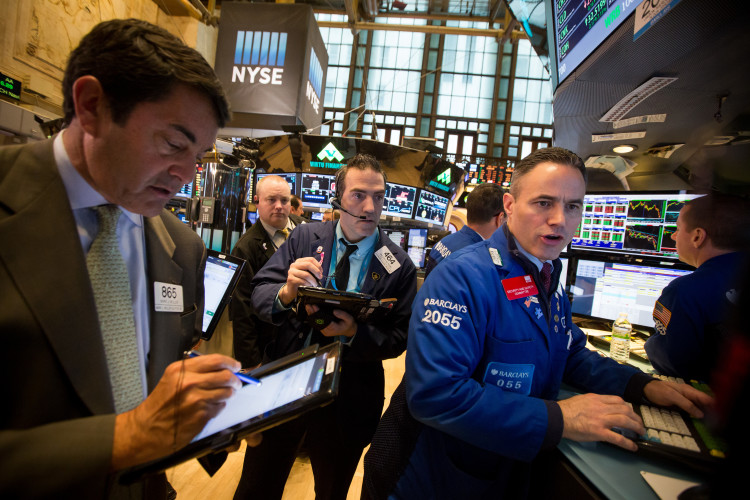U.S. Stocks Fall Most in Four Weeks Amid Renewed Growth Worries

published Aug 2nd 2016, 3:31 pm, by Anna-Louise Jackson and Bailey Lipschultz
(Bloomberg) —
U.S. stocks declined the most in four weeks, as sliding crude prices and lackluster consumer spending data revived anxiety that global growth will falter.
Equities narrowly avoided their worst day since the selloff following Britain’s vote to leave the European Union, with automakers pummeled as sales disappointed while retailers had the steepest drop in five weeks. Pfizer Inc. fell 2.5 percent after leaving its full-year forecast unchanged, even as quarterly profit and sales exceeded predictions, and Apple Inc. lost 1.5 percent to weigh on the technology group.
The S&P 500 Index retreated 0.6 percent to 2,157.03 at 4 p.m. in New York, marking the first back-to-back declines since the Brexit vote. The Dow Jones Industrial Average fell 90.74 points, or 0.5 percent, to 18,313.77 as the gauge dropped for a seventh day, the longest in nearly a year. The Nasdaq Composite Index sank 0.9 percent, after coming within 1 percent of a record yesterday.
“There really isn’t reason to keep bidding the market higher right now,” said Malcolm Polley, who oversees $1.3 billion as president and chief investment officer at Stewart Capital Advisors LLC in Indiana, Pennsylvania. “A pullback in the market is necessary just from a valuation standpoint. Our expectation for the year is we’ll be flat-to-down in the equity markets.”
At 18.3 times this year’s projected earnings, the S&P 500 is trading near its highest multiple in more than a decade. Still, stronger-than-estimated earnings results and speculation that central banks will maintain loose monetary policies to buttress growth have helped to underpin equities as they hover near record levels.
Better-than-forecast earnings and economic data helped support the S&P 500’s run to its first all-time high in more than 13 months, with the index rebounding as much as 8.7 percent after the Brexit vote rattled markets worldwide. The rally lost steam last week, though, as a report showed weaker-than-expected growth in the second quarter. Manufacturing also expanded at a slower pace in July, according to data released on Monday.
Traders have pushed back their expectations for the next Federal Reserve interest-rate increase, with the first month with at least even odds for a hike now September 2017, compared with February a week ago. The Fed last week held rates unchanged as forecast but reiterated its intention to raise them gradually.
With investors looking for signs that growth is picking up, a report today showed consumer purchases climbed a bit more than anticipated in June, exceeding a gain in incomes that prompted American households to tap into savings. Data on employment, durable-goods orders and factory activity are due later this week.
Earnings Watch
More than two-thirds of S&P 500 companies have reported this earnings season, and about 80 percent have topped profit estimates while 57 percent beat sales projections. Analysts predict net income for index members fell 3.2 percent in the second quarter, better than estimates for a 5.8 percent contraction in mid-July.
Among companies posting results, Mallinckrodt Plc surged 14 percent for its biggest gain in three years after raising its profit outlook. Discovery Communications Inc. posted its strongest rally in five years, and CVS Health Corp. climbed 4.9 percent after their profits beat estimates. Royal Caribbean Cruises Ltd. tumbled 6.3 percent, and Emerson Electric Co. slid 4.9 percent after the companies lowered their 2016 outlooks.
“When you consider that U.S. equities have had quite a good run lately and they’re just so expensive right now, it seems like a sensible time to take some profits and sit the market out,” said Heinz-Gerd Sonnenschein, an equity strategist at Deutsche Postbank AG in Bonn, Germany.
Volume Rises
In Tuesday’s trading, the CBOE Volatility Index rose for a second day, up 7.5 percent to 13.37, after jumping as much as 14 percent. The measure of market turbulence known as the VIX fell 24 percent last month, the most since March. About 7.5 billion shares traded hands on U.S. exchanges, 6 percent above the three-month average.
Nine of the S&P 500’s 10 main industries sank, led by a declines 1.5 percent decline in consumer-discretionary shares. Industrial, financial and tech companies dropped at least 0.8 percent. Energy producers rose 0.9 percent after briefly erasing a 1.4 percent climb as a rally in crude faded.
“It really isn’t one specific thing that’s dragging the market lower,” said Michael James, managing director of equity trading at Wedbush Securities Inc. in Los Angeles. “It’s a little bit of carryover from the weakness we’ve seen in oil — the market’s been incredibly resilient given the 20 percent correction we’ve seen in the price of oil in the last month and yet the equity markets have not pulled back much.”
Retailers and automakers in the S&P 500 led the consumer-discretionary group to the biggest slide since June 27, which was the second of the two-day Brexit selloff. Retailers fell from an all-time high reached yesterday, paced by Amazon.com Inc.’s 0.9 percent decline, while Target Corp. and CarMax Inc. decreased more than 2.1 percent. Ford Motor Co. and General Motors Co. lost at least 4.3 percent as their July sales missed analysts’ estimates. Ford shares sank to the lowest since February.
Delta Weighs
Delta Air Lines Inc. dragged down industrial stocks, declining 7.8 percent after a closely watched measure of revenue fell 7 percent in July, due in part to too many empty seats on transatlantic flights. JetBlue Airways Corp. and American Airlines Group Inc. tumbled at least 5.8 percent, as the Bloomberg U.S. Airlines Index also slumped 5.8 percent to a three-week low.
Financial shares in the benchmark capped a third straight decline, the longest in seven weeks. Citigroup Inc. fell 1 percent as overseas risks continue to mount in the aftermath of Brexit. American Express Co. lost 1 percent, and mall operator Simon Property Group Inc. sank 1.8 percent after being downgraded to the equivalent of neutral from buy at RBC Capital Markets.
Health-care companies pared losses in the late afternoon as Biogen Inc. jumped 9.4 percent for its strongest gain in four months. The Wall Street Journal reported that Merck & Co. and Allergan Plc have each considered a takeover of the biotechnology company.
Energy producers rallied in the final hour of trading, despite crude oil falling for the eighth time in nine days. Williams Cos. rose 6.4 percent, its best day since May 16, after becoming the latest pipeline company to cut its quarterly dividend in the face of low energy prices and questions about its strategy as a standalone company.
–With assistance from Sofia Horta e Costa. To contact the reporters on this story: Anna-Louise Jackson in New York at ajackson36@bloomberg.net ;Bailey Lipschultz in New York at blipschultz@bloomberg.net To contact the editors responsible for this story: Cecile Vannucci at cvannucci1@bloomberg.net John Shipman
copyright
© 2016 Bloomberg L.P







No Comment